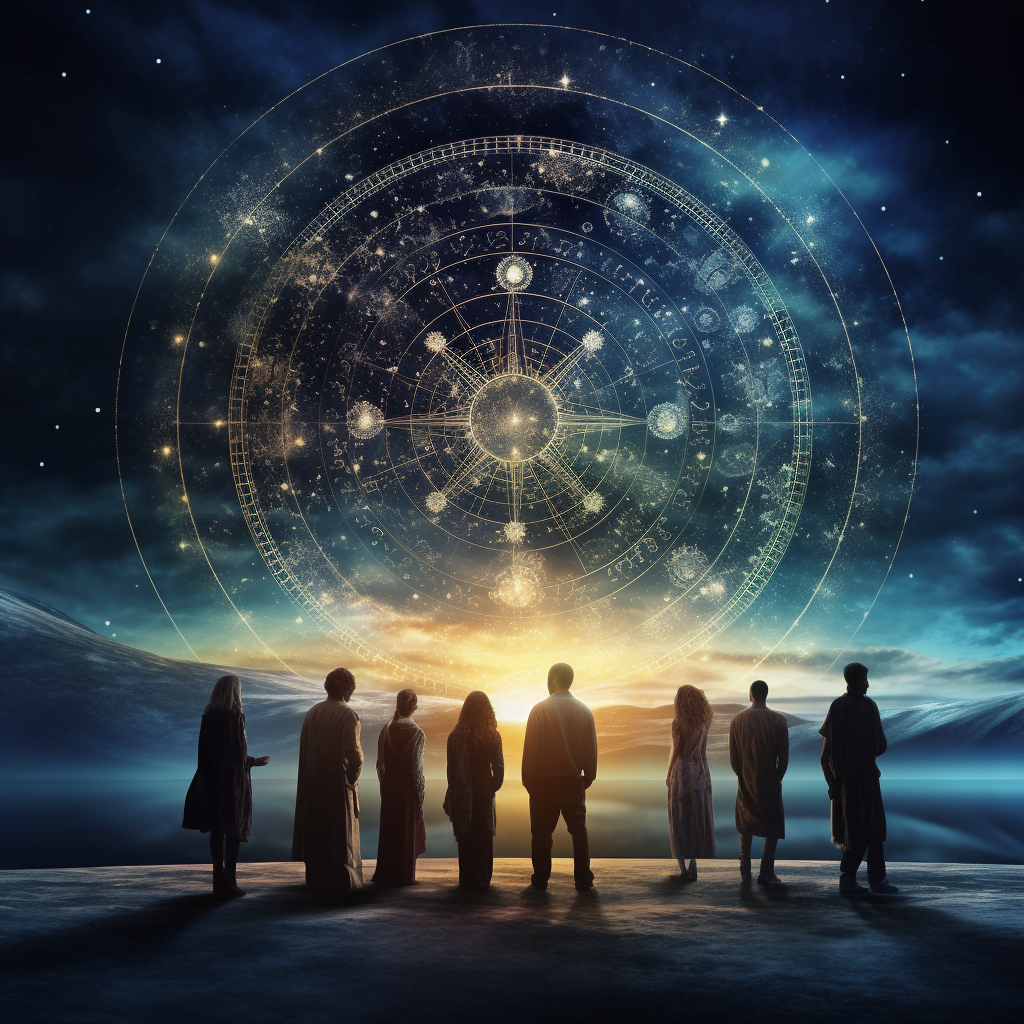As I delved into the intriguing world of ancient civilizations, a particular question captured my attention: Did the Egyptians create the Zodiac? The concept of astrology and its influence on our lives has fascinated humans for centuries, but its origins remain a mystery. The Egyptians, renowned for their advanced knowledge in various fields, have often been associated with the creation of the zodiac. In this article, I will explore the evidence and theories surrounding this intriguing topic, shedding light on the possible Egyptian connection to the Zodiac’s creation.
What is the Zodiac?
The Zodiac is a system of twelve constellations that astrologers believe can predict and influence human characteristics and events based on the position of celestial bodies at the time of a person’s birth. It is commonly used to create horoscopes, which provide insights into an individual’s personality traits, strengths, weaknesses, and potential future. The Zodiac has a rich history and has been influenced by various ancient civilizations, including the Egyptians. In this article, I will explore the origins of the Zodiac, the Egyptian influence on astrology, the Dendera Zodiac, Greek contributions, a comparison of Egyptian and Greek zodiacs, the legacy of the Zodiac, the Egyptian influence on contemporary horoscopes, and finally, the debunking of the Egyptian origin theory.
The Origins of the Zodiac
To understand the influence of the Egyptians on the Zodiac, it is essential to delve into its early beginnings. The exact origins of the Zodiac are difficult to pinpoint, as it emerged from a combination of different ancient cultures’ astronomical observations and beliefs. However, one civilization that played a crucial role in its development was Mesopotamia.
Early Beginnings
In ancient Mesopotamia, astrologers closely observed the movements of stars and planets and believed that these celestial bodies held mystical powers that could shape human destiny. They divided the night sky into twelve equal parts, each named after a constellation. This division laid the foundation for the concept of the Zodiac as we know it today.
Mesopotamian Influence
The influence of Mesopotamian astrology extended beyond its initial observations. As neighboring civilizations interacted with Mesopotamia, they adopted and adapted its astrological practices. One such civilization was ancient Egypt, which incorporated elements of Mesopotamian astrology into its religious and cultural beliefs.
Egyptian Influence on Astrology
The ancient Egyptians had a deeply rooted belief in the interconnectedness of the universe and the divine. They attributed great importance to celestial bodies and their relationship with human life. This belief system heavily influenced their approach to astrology.
Ancient Egyptian Beliefs
The ancient Egyptians believed that each individual was assigned a ruling deity based on the time and date of their birth. They believed that these deities would guide and influence their lives throughout their earthly journey. This belief formed the basis of Egyptian astrology, which focused on understanding the unique characteristics and destiny of each person based on their astrological sign.
Astrological Practices in Egypt
In Egypt, astrologers utilized different symbols and hieroglyphs to represent the twelve astrological signs. These signs aligned closely with the constellations of the Zodiac, although there were slight variations in their representations. Egyptian astrologers would meticulously study the movement of celestial bodies and interpret their meanings to provide insight into an individual’s personality, relationships, and future prospects.
The Dendera Zodiac
One of the most significant archaeological discoveries in relation to the Egyptian influence on the Zodiac is the Dendera Zodiac. Dating back to the Greco-Roman period, the Dendera Zodiac is a bas-relief found on the ceiling of the Dendera Temple complex in Egypt.
Discovery and Symbolism
The Dendera Zodiac depicts the twelve astrological signs and various other celestial figures, emphasizing the importance of astrology in ancient Egyptian culture. The intricate carvings and detailed representations of the Zodiac signs highlight the connection between the cosmos and human existence according to Egyptian beliefs.
Controversies and Interpretations
While the Dendera Zodiac provides valuable insights into ancient Egyptian astrological practices, its exact interpretation remains a subject of debate. Some scholars argue that it serves as definitive evidence of the Egyptians’ creation of the Zodiac, while others believe it represents a fusion of various cultural influences. The controversies surrounding the Dendera Zodiac add to the complexity of tracing the origins of the Zodiac.
Greek Contributions to the Zodiac
The Greeks made significant contributions to the development and popularization of astrology and the Zodiac. Hellenistic astrology, which emerged during the late Hellenistic period, blended the astrological traditions of various civilizations, including the Egyptians.
Hellenistic Astrology
Hellenistic astrology combined the Egyptian and Mesopotamian astrological systems with Greek philosophical and mathematical ideas. It introduced new techniques and concepts, such as the use of planetary rulerships and the division of the Zodiac into equal thirty-degree segments, known as the signs.
The Twelve Zodiac Signs
One of the most enduring legacies of Greek astrology is the division of the Zodiac into twelve equal signs, each associated with specific personality traits. These signs, including Aries, Taurus, Gemini, Cancer, Leo, Virgo, Libra, Scorpio, Sagittarius, Capricorn, Aquarius, and Pisces, have become fundamental in astrology across various cultures and continue to be widely recognized and used today.
Comparison of Egyptian and Greek Zodiacs
While both the Egyptian and Greek civilizations made significant contributions to the development of astrology and the Zodiac, there are notable differences and similarities between their interpretations and symbolism.
Differences in Symbolism
The Egyptian Zodiac is often associated with animal symbolism, with each astrological sign represented by a different animal. In contrast, the Greek Zodiac focuses more on human archetypes and characteristics. This distinction reflects cultural and religious variations between the two civilizations.
Similarities in Concepts
Despite their differences, the Egyptian and Greek zodiacs share common concepts and themes. Both civilizations believed in the profound influence of celestial bodies on human life and attributed specific traits and characteristics to individuals based on their astrological sign. The idea of a cyclical nature of time, as reflected in the recurring pattern of the Zodiac signs, also unites the two systems.
The Legacy of the Zodiac
The Zodiac’s rich history and cultural significance have ensured its endurance throughout the centuries. Today, the Zodiac continues to play a significant role in modern astrology and popular culture.
Modern Astrology
Astrology, encompassing both the belief in cosmic influence and the practice of interpreting astrological signs, remains popular around the world. Many people turn to astrology for guidance and understanding of themselves and others, seeking answers to questions about love, career, and personal growth.
Popular Zodiac Systems
In addition to the Egyptian and Greek Zodiacs, other civilizations have contributed their interpretations and variations to the Zodiac system. Chinese astrology, for example, features twelve animal signs that correspond to years. The inclusion of these different systems within the broader context of astrology has enriched its diversity and appeal.
Egyptian Influence on Contemporary Horoscopes
The enduring influence of the ancient Egyptians on astrology can be observed in contemporary horoscopes. Astrologers and enthusiasts who embrace Egyptian symbolism and beliefs have revived and incorporated them into modern interpretations of the Zodiac.
Astrological Revival
In recent years, there has been a resurgence of interest in ancient Egyptian astrology. Many individuals seek horoscopes that incorporate Egyptian deities, symbols, and rituals as a way to connect with the profound spiritual and cultural heritage of Egypt.
Inclusion of Egyptian Symbols
Astrologers who draw inspiration from ancient Egypt often incorporate Egyptian symbols and mythological references into their interpretations. For example, they may associate the Sphinx with the sign of Leo or incorporate the Egyptian god Thoth, known as the god of wisdom and writing, into interpretations of the sign of Gemini.
Debunking the Egyptian Origin Theory
While the Egyptian influence on the Zodiac is evident, the claim that the Egyptians were the sole creators of the Zodiac is not supported by concrete evidence.
Lack of Concrete Evidence
Despite the existence of ancient Egyptian astrological practices and artifacts like the Dendera Zodiac, there is no conclusive evidence that explicitly states that the Egyptians originated the Zodiac. The widely accepted consensus among scholars is that the Zodiac evolved from a combination of various civilizations’ contributions.
Alternative Explanations
Other theories suggest that the Babylonians, who inherited the Mesopotamian astrological system, played a more significant role in the development of the Zodiac. Some argue that other civilizations, such as the Phoenicians or Persians, may have influenced the Egyptian and Greek interpretations of the Zodiac. The complexity of tracing the exact origins of the Zodiac necessitates considering multiple cultural influences.
Conclusion
The Zodiac, with its roots in multiple ancient civilizations, serves as a fascinating testament to humanity’s enduring fascination with the cosmos and its impact on our lives. The Egyptian civilization, with its profound belief in the interplay between celestial bodies and human destiny, made significant contributions to astrology and influenced the development of the Zodiac. However, it is important to recognize that the Zodiac is a product of cultural exchange and evolution, with influences coming from Mesopotamia, Greece, and other civilizations. Today, the Zodiac continues to captivate millions, serving as a source of self-reflection, guidance, and inspiration for those who seek a deeper understanding of themselves and the world around them.



